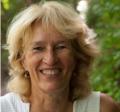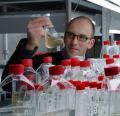Plenary speakers

Ester Serrao is a Professor at the University of Algarve and leads a research team at the Centre of Marine Sciences (CCMAR) in Portugal. She got her PhD at the University of Maine, USA, focusing on reproductive ecology, ecophysiology and phylogeny of fucoid algae. At present her team studies how marine populationsdisperse, evolve and adapt as species ranges shift, as response to habitat and climatic changes. The development of molecular tools for studying population genetic structure, gene expression and the ecological genomics of algal stress responses forms a central tenet in her research. She has published more than 130 peer-reviewed articles and supervised >40 graduate students. For more information see http://www.ccmar.ualg.pt/
Selected publications:
- Nicastro KR, Zardi GI, Teixeira S, Neiva J, Serrao EA, Pearson GA. (2013) Shift happens: trailing edge contraction associated with recent warming trends threatens a distinct genetic lineage in the marine macroalga Fucus vesiculosus. BMC Biology doi:10.1186/1741-7007-11-6
- Neiva J, Pearson GA, Valero M, Serrao EA. (2010). Surfing the wave on a borrowed board: range expansion and spread of introgressed organellar genomes in the seaweed Fucus ceranoides L. Molecular Ecology, 19:4812-4822
- Assis J, Coelho N, Alberto F, Varelo M, Raimondi P, Reed D, Serrao EA (2013) High and distinct range edge genetic diversity despite local bottlenecks. PLOS ONE 8(7): e68646.

John Archibald is a Professor in the Department of Biochemistry & Molecular Biology at Dalhousie University (Halifax, Canada). Dr. Archibald received his Ph.D. from Dalhousie University in 2001 and returned as a faculty member in 2003. Dr. Archibald’s scientific interests revolve around the diversity of microbial eukaryotes and the origin and evolution of eukaryotic organelles. His research team is presently focused on the genomics of endosymbiosis and the diversification of plastids. Dr. Archibald is the author of more than 100 scientific publications, and is the author of One Plus One Equals One: Symbiosis and the Evolution of Complex Life, which will be published in June 2014 by Oxford University Press. For more information see http://myweb.dal.ca/jmarchib/.
Selected publications:
- Curtis, B. A. et al. 2012. Algal nuclear genomes reveal evolutionary mosaicism and the fate of nucleomorphs. Nature. 492, 59-65.
- Archibald, J. M. 2011. Origin of eukaryotic cells: 40 years on. Symbiosis. 54, 69-86.
- Archibald, J. M. 2009. The puzzle of plastid evolution. Curr. Biol. 19, R81-R88.

Ellen van Donk graduated from the University of Amsterdam in 1983 (PhD in Aquatic Ecology). She joined the NIOO-KNAW (Netherlands Institute for Ecology) in 1998 as Head of the Department of Aquatic Ecology where she continues to examine her main research interests in plankton dynamics and ecology, phytoplankton succession, lake eutrophication and ecosystem stress. She investigates how anthropogenic changes, such as climate change, eutrophication, habitat fragmentation and the introduction of invasive species affect the food web structure, biodiversity and ecosystem services of aquatic ecosystems at multiple levels of spatial scale (local and regional). For more information see http://www.nioo.knaw.nl/users/evandonk.
Selected publications:
- Van Donk, E., Ianora, A. & Vos, M. 2011. Induced defences in marine and freshwater phytoplankton: a review. Hydrobiologia 668:3-19.
- Sommer, U., Adrian, R., Domis, L. D., Elser, J. J., Gaedke, U., Ibelings, B., Jeppesen, E., Lurling, M., Molinero, J. C., Mooij, W. M., van Donk, E. & Winder, M. 2012. Beyond the Plankton Ecology Group (PEG) Model: Mechanisms Driving Plankton Succession. Annual Review of Ecology, Evolution, and Systematics, Vol 43 43:429-48.
- van de Waal, D. B., Verschoor, A. M., Verspagen, J. M. H., van Donk, E. & Huisman, J. 2010. Climate-driven changes in the ecological stoichiometry of aquatic ecosystems. Frontiers in Ecology and the Environment 8:145-52.

Georg Pohnert is a Professor in the Department of Biochemistry & Molecular Biology at Friedrich Schiller University (Jena, Germany). He received his Ph.D. from the University of Bonn under Prof. W. Boland. The group of Georg Pohnert elucidates new chemical defence- and communication strategies of marine algae using the tools of modern bioorganic chemistry with the ultimate goal an understanding of the chemical language spoken between marine organisms. For more information see https://www.uni-jena.de/Prof__Dr__Georg_Pohnert.html.
Selected publications:
- Gillard, J., Frenkel, J., Devos, V., Sabbe, K., Paul, C., Rempt, M., Inzé, D., Pohnert, G., Vuylsteke, M. and Vyverman, W. (2013) Metabolomics enables the structure elucidation of a diatom sex pheromone. Angewandte Chemie International Edition 52, 854–857.
- Vanelslander, B., Paul, C., Grueneberg, J., Prince, E. K., Gillard, J., Sabbe, K., Pohnert, G. and Vyverman, W. (2012) Daily bursts of biogenic cyanogen bromide (BrCN) control biofilm formation around a marine benthic diatom. Proc Natl Acad Sci U S A 109, 2412–2417.
- Pohnert, G., Steinke, M. & Tollrian, R. 2007. Chemical cues, defence metabolites and the shaping of pelagic interspecific interactions. Trends Ecol. Evol. 22:198-204.
- 8452 reads
